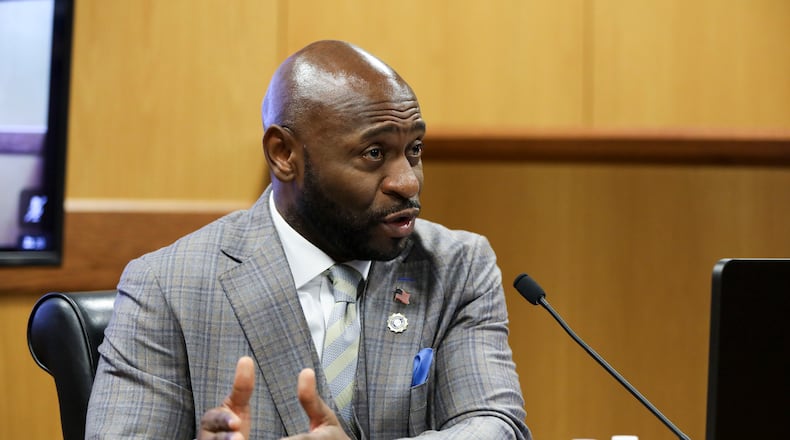WASHINGTON ― Former Fulton County special prosecutor Nathan Wade on Tuesday defended his work investigating Donald Trump, telling a congressional panel that Georgia’s criminal case against the former president and his allies was driven by facts — not politics.
Departing Capitol Hill after roughly four hours of closed-door questioning, Wade and his two lawyers declined to go into detail about the questions that staff members for the U.S. House Judiciary Committee asked him. Roy Barnes, the former Democratic governor of Georgia who was recently added to Wade’s legal team, said the meeting was effective and that he did not expect Wade to need to return.
“We gave our testimony, cooperated and we are through,” Barnes said.
Wade, who had been subpoenaed, read aloud a three-page opening statement to begin the sworn deposition, and said he was appearing before the committee voluntarily.
Wade told the committee staff members present that he was part of a team that investigated efforts to interfere in Georgia’s 2020 election for more than two years and that he did so with integrity and by seeking the truth.
“The case was not politically motivated,” he said, according to the prepared remarks. “Rather, it was an independent investigation based upon facts, interviews, evidence and the rule of law.”
The GOP-led panel was expected to question Wade about the case, which he oversaw until he was forced to step aside in March. The committee also likely asked about meetings between the District Attorney’s office and the White House and congressional Jan. 6 committee, as well as the DA’s use of federal grant funding.
Wade was trailed by reporters as he walked into the committee room around 10 a.m. accompanied by his legal team, which consisted of attorney Andrew Evans and Barnes. Barnes has also been representing Fulton District Attorney Fani Willis before the Judiciary Committee.
The interview concluded around 2:30 p.m. Republican and Democratic staff members of the committee took turns leading rounds of questioning with Wade each hour.
For more than a year, the Judiciary panel has investigated Willis and her handling of the 2020 election interference case involving Trump and more than a dozen others. Chairman Jim Jordan is one of Trump’s most prominent Capitol Hill loyalists.
The Ohio Republican has accused Willis and Wade, her onetime deputy and ex-romantic partner, of profiting off the Trump case, which he’s described as a “politically motivated prosecution.”
Credit: TNS
Credit: TNS
Barnes hasn’t hesitated to hit back against Jordan, writing in a Sept. 30 letter that the chairman “take some deep breaths and calm down.”
“An anger management course might also help,” said Barnes, who served as governor from 1999 to 2003.
It was not immediately clear how satisfied committee leadership was by Wade’s answers.
In a letter to Wade late last week, Willis told him he had a “continuing obligation not to disclose any confidential information related to ongoing criminal matters on which you worked” and that the DA’s office was “asserting all applicable legal protections and privileges over the information you obtained” while working as special prosecutor.
The Marietta attorney’s appearance was months in the making. His lawyers had been in talks with the Judiciary Committee before the panel opted to subpoena him last month. Wade in his opening statement pushed back against reporting that he evaded service of the subpoena, saying he “voluntarily reached out” to the U.S. Marshals Service to suggest a time and place to meet “immediately upon being made aware through false, inflammatory media reports, of Congress’ attempts to serve me.”
Wade has been of interest to the Judiciary committee ever since a group of defendants in the election interference case publicized the details of his romantic relationship with Willis and accused the DA of a conflict of interest.
Indeed, the bulk of the election interference case remains frozen as the Georgia Court of Appeals considers arguments from those defendants, who say Willis and her office should be removed from the prosecution in part because of the DA’s personal relationship with Wade. Oral arguments are scheduled for Dec. 5.
Jordan previously said that Wade’s testimony could help the committee determine whether it needs to advance legislation to “remedy politically motivated local prosecutions” or set stricter guidelines on how federal grant funds are used.
The probe is also part of a broader effort by Trump’s allies to undermine Willis’ prosecution of Trump ahead of the November elections.
Credit: AP
Credit: AP
Keep Reading
The Latest
Featured






